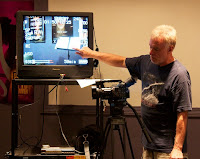So why are we not teaching media literacy? First, for most people, it is simply not on the radar screen. We just don’t understand what media literacy is. Second, there is a lack of instructors. Media literacy is a difficult subject to teach if you don’t have a background in media. Third, we don’t believe there is a media crisis. Media is no big deal. Fourth, we are not sure what our views are on media. So why get into it.
But what does a good media course consist of? First, the program must encourage people to think for themselves. When I teach media literacy, I tell my students that I am not here to tell you what to think but to challenge you to start to think about what you see and hear in the media. You must come to your own conclusions. Second, the program should be designed to not paint Hollywood as the villain. We must be objective. Third, media literacy needs to be interactive through a multimedia presentation.
A media literacy program contains the following: (1) It starts with awareness and education. (2) In order to apply media literacy, you must develop a skill set that utilizes various techniques and strategies. In other words, it offers you a toolbox that you can use to unlock and read the multiple layers of image-based communications. (3) In order for media literacy to be successful, it must be applied daily.
The most important elements of media literacy are common sense tools, such as teaching students how filmmakers use editing to create a reality that doesn’t exist, how colors can create different emotional responses, or how camera movement and angles can affect an audience’s perspective.
And the most critical part is challenging students to take control of how the message is impacting them. Should I accept or reject the message? Does it reinforce my beliefs? Does it ignite my passion to live a life consistent with my Christian principles? Does it challenge me to bring positive change to my life as well as to others? Does it cause me to act on my beliefs? Does it cause me to be more socially conscious? Or do I reject the message because it is not consistent with my Christian beliefs? The more we ask ourselves challenging questions, the closer we are to discovering the truth



No comments:
Post a Comment